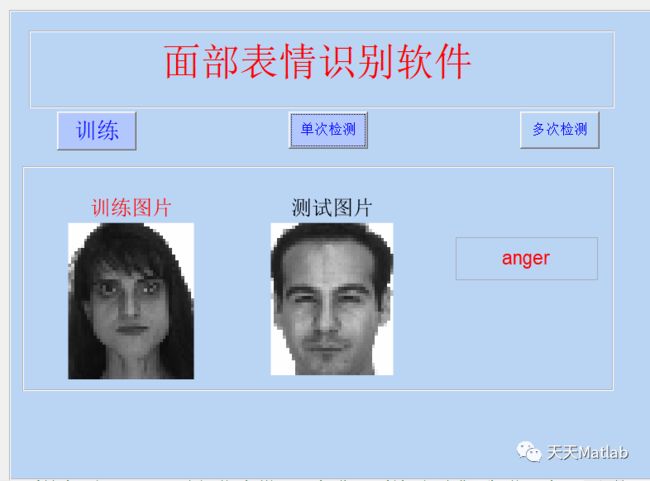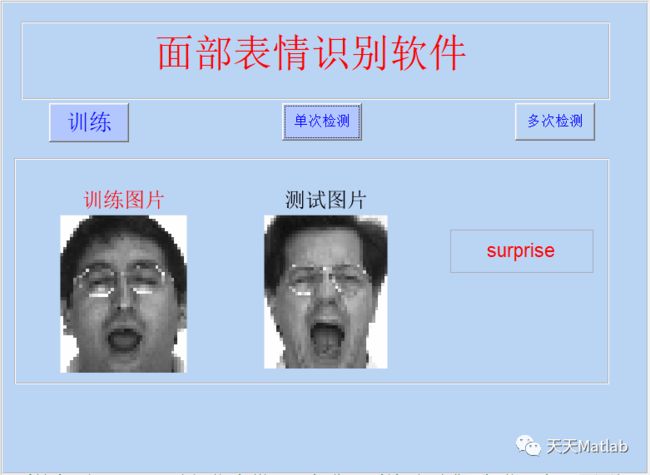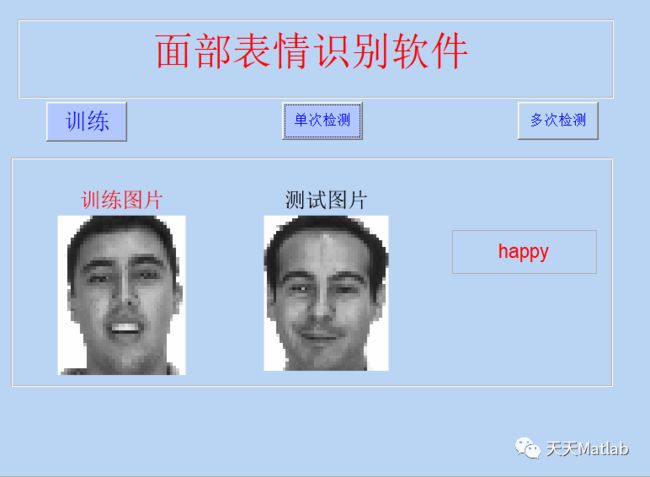【图像识别】基于模板匹配算法实现人脸表情识别matlab代码
1 简介
面部表情识别是计算机科学与人机交互领域的一个新兴研究课题。面部表情是人们内心情感的真实表露。美国著名心理学家阿尔培特认为,在人们进行感情表达时,往往言词的使用只占7%,声调占38%,而剩下的55%由面部表情来完成[1]。人脸表情识别的目的是让人工智能产品能够识别出人的表情,进而分析人的内心情感。人脸表情识别对人机交互、安全、机器人、通信和汽车领域都起着不可估量的作用;因此,对于人脸表情识别的研究具有非常重要的研究和应用价值。 表情识别主要分为两大类:动态视频的表情识别和静态图像的表情识别。本人针对静态图像的表情识别做了如下工作: 1.研究并实现了基于模板匹配方法的人脸检测,包括制作人脸模板,选择匹配算法及采用马赛克检验方法检测人脸;在表情识别中,成功检测人脸是表情识别的首要任务。 2.研究并实现了表情图像的预处理算法,由于各种图像尺寸不同,背景不同,并会有多种光照条件的影响,因此,首先采用直方图均衡化等方法对图像进行预处理。预处理为提高表情识别率奠定了良好的基础。 3.实现基于轴对称性的人眼和嘴巴的定位方法,假设单眼区域和嘴巴区域均具有关于中心垂线轴对称的特性,首先找到一只单眼的下半部分区域,迭代选择候选眼睛中心,再利用轴对称性确定整只眼睛的区域,同理可确定另一只眼睛区域及嘴巴区域。在表情识别中,能否准确定位眼睛和嘴巴直接影响到特征值的提取和识别率。
2 部分代码
function varargout = FacialExpressionRecognitiontool(varargin)
% FACIALEXPRESSIONRECOGNITIONTOOL MATLAB code for FacialExpressionRecognitiontool.fig
% FACIALEXPRESSIONRECOGNITIONTOOL, by itself, creates a new FACIALEXPRESSIONRECOGNITIONTOOL or raises the existing
% singleton*.
%
% H = FACIALEXPRESSIONRECOGNITIONTOOL returns the handle to a new FACIALEXPRESSIONRECOGNITIONTOOL or the handle to
% the existing singleton*.
%
% FACIALEXPRESSIONRECOGNITIONTOOL('CALLBACK',hObject,eventData,handles,...) calls the local
% function named CALLBACK in FACIALEXPRESSIONRECOGNITIONTOOL.M with the given input arguments.
%
% FACIALEXPRESSIONRECOGNITIONTOOL('Property','Value',...) creates a new FACIALEXPRESSIONRECOGNITIONTOOL or raises the
% existing singleton*. Starting from the left, property value pairs are
% applied to the GUI before FacialExpressionRecognitiontool_OpeningFcn gets called. An
% unrecognized property name or invalid value makes property application
% stop. All inputs are passed to FacialExpressionRecognitiontool_OpeningFcn via varargin.
%
% *See GUI Options on GUIDE's Tools menu. Choose "GUI allows only one
% instance to run (singleton)".
%
% See also: GUIDE, GUIDATA, GUIHANDLES
% Edit the above text to modify the response to help FacialExpressionRecognitiontool
% Last Modified by GUIDE v2.5 23-Oct-2014 12:52:25
% Begin initialization code - DO NOT EDIT
gui_Singleton = 1;
gui_State = struct('gui_Name', mfilename, ...
'gui_Singleton', gui_Singleton, ...
'gui_OpeningFcn', @FacialExpressionRecognitiontool_OpeningFcn, ...
'gui_OutputFcn', @FacialExpressionRecognitiontool_OutputFcn, ...
'gui_LayoutFcn', [] , ...
'gui_Callback', []);
if nargin && ischar(varargin{1})
gui_State.gui_Callback = str2func(varargin{1});
end
if nargout
[varargout{1:nargout}] = gui_mainfcn(gui_State, varargin{:});
else
gui_mainfcn(gui_State, varargin{:});
end
% End initialization code - DO NOT EDIT
% --- Executes just before FacialExpressionRecognitiontool is made visible.
function FacialExpressionRecognitiontool_OpeningFcn(hObject, eventdata, handles, varargin)
% This function has no output args, see OutputFcn.
% hObject handle to figure
% eventdata reserved - to be defined in a future version of MATLAB
% handles structure with handles and user data (see GUIDATA)
% varargin command line arguments to FacialExpressionRecognitiontool (see VARARGIN)
% Choose default command line output for FacialExpressionRecognitiontool
set(handles.togglebutton1,'visible','off')
set(handles.togglebutton2,'visible','off');
set(handles.text2,'visible','off');
set(handles.edit2,'visible','off');
set(handles.text3,'visible','off');
axes(handles.axes2)
cla
axes(handles.axes1)
cla
handles.output = hObject;
% Update handles structure
guidata(hObject, handles);
end
eta = (IsTrue/TotImg)*100;
set(handles.edit2,'visible','on');
set(handles.text3,'visible','on');
set(handles.edit2,'String',[num2str(eta) '%']);
drawnow;
set(handles.togglebutton1,'visible','off')
set(handles.togglebutton2,'visible','off');
% --- Executes on button press in togglebutton1.
function togglebutton1_Callback(hObject, eventdata, handles)
% hObject handle to togglebutton1 (see GCBO)
% eventdata reserved - to be defined in a future version of MATLAB
% handles structure with handles and user data (see GUIDATA)
set(handles.togglebutton1,'value',1)
% Hint: get(hObject,'Value') returns toggle state of togglebutton1
% --- Executes on button press in togglebutton2.
function togglebutton2_Callback(hObject, eventdata, handles)
% hObject handle to togglebutton2 (see GCBO)
% eventdata reserved - to be defined in a future version of MATLAB
% handles structure with handles and user data (see GUIDATA)
set(handles.togglebutton2,'value',1);
% Hint: get(hObject,'Value') returns toggle state of togglebutton2
% --- Executes during object creation, after setting all properties.
function text4_CreateFcn(hObject, eventdata, handles)
% hObject handle to text4 (see GCBO)
% eventdata reserved - to be defined in a future version of MATLAB
% handles empty - handles not created until after all CreateFcns called
function edit2_Callback(hObject, eventdata, handles)
% hObject handle to edit2 (see GCBO)
% eventdata reserved - to be defined in a future version of MATLAB
% handles structure with handles and user data (see GUIDATA)
% Hints: get(hObject,'String') returns contents of edit2 as text
% str2double(get(hObject,'String')) returns contents of edit2 as a double
% --- Executes during object creation, after setting all properties.
function edit2_CreateFcn(hObject, eventdata, handles)
% hObject handle to edit2 (see GCBO)
% eventdata reserved - to be defined in a future version of MATLAB
% handles empty - handles not created until after all CreateFcns called
% Hint: edit controls usually have a white background on Windows.
% See ISPC and COMPUTER.
if ispc && isequal(get(hObject,'BackgroundColor'), get(0,'defaultUicontrolBackgroundColor'))
set(hObject,'BackgroundColor','white');
end
function edit5_Callback(hObject, eventdata, handles)
% hObject handle to edit5 (see GCBO)
% eventdata reserved - to be defined in a future version of MATLAB
% handles structure with handles and user data (see GUIDATA)
% Hints: get(hObject,'String') returns contents of edit5 as text
% str2double(get(hObject,'String')) returns contents of edit5 as a double
% --- Executes during object creation, after setting all properties.
function edit5_CreateFcn(hObject, eventdata, handles)
% hObject handle to edit5 (see GCBO)
% eventdata reserved - to be defined in a future version of MATLAB
% handles empty - handles not created until after all CreateFcns called
% Hint: edit controls usually have a white background on Windows.
% See ISPC and COMPUTER.
if ispc && isequal(get(hObject,'BackgroundColor'), get(0,'defaultUicontrolBackgroundColor'))
set(hObject,'BackgroundColor','white');
end
% --- Executes during object creation, after setting all properties.
function text2_CreateFcn(hObject, eventdata, handles)
% hObject handle to text2 (see GCBO)
% eventdata reserved - to be defined in a future version of MATLAB
% handles empty - handles not created until after all CreateFcns called
% --- Executes during object creation, after setting all properties.
function text3_CreateFcn(hObject, eventdata, handles)
% hObject handle to text3 (see GCBO)
% eventdata reserved - to be defined in a future version of MATLAB
% handles empty - handles not created until after all CreateFcns called
% --- Executes during object creation, after setting all properties.
function axes2_CreateFcn(hObject, eventdata, handles)
% hObject handle to axes2 (see GCBO)
% eventdata reserved - to be defined in a future version of MATLAB
% handles empty - handles not created until after all CreateFcns called
% Hint: place code in OpeningFcn to populate axes2
% --- Executes during object creation, after setting all properties.
function axes1_CreateFcn(hObject, eventdata, handles)
% hObject handle to axes1 (see GCBO)
% eventdata reserved - to be defined in a future version of MATLAB
% handles empty - handles not created until after all CreateFcns called
% Hint: place code in OpeningFcn to populate axes1
3 仿真结果
4 参考文献
[1]樊引刚. 人脸表情识别系统的研究与实现[D]. 北京交通大学.
![]()


